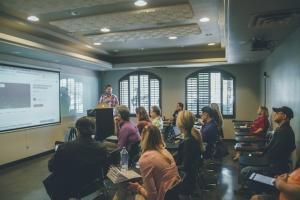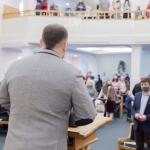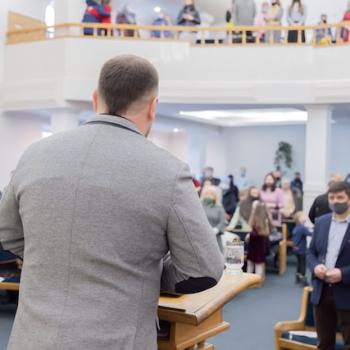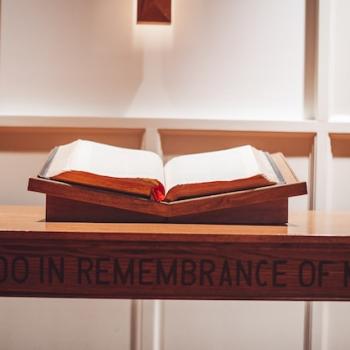Once, at a work-related social event, I ran into someone I recognized. Let’s call him Nick. I remembered Nick from a week-long training I had attended a while prior. He had been invited to share his advice and experiences as part of one of the class sessions.
Since I was part of the class and he was up in front of the class, I didn’t expect him to remember me. So I introduced myself and mentioned that I remembered him from the training. Nick responded positively, and we chatted for a few minutes.
Then a couple other people joined our conversation. They asked how we knew each other, and Nick answered quickly, “I taught a class that Liz was in!”
I nodded and smiled. There wasn’t really much else to do in the moment. But what he said didn’t sit well with me.
“I Taught a Class…”
I thought, if I had been in his position, I might have said something more like, “we met last year at the such-and-such training!” Or, more precisely, “we met at the such-and-such training, where the people teaching the class had invited me to come and share.”
The word “taught” did not feel quite right. And the word “class” could mean just about anything.
In this particular case, the classes were all day every day for five days straight. Nick had been invited to speak to us and field questions about his work for maybe half an hour or forty-five minutes.
Other people taught the classes and had invited him as part of their lesson plan. And he was only there for a very small part of the week-long class series.
His statement, “I taught a class that Liz was in,” felt a bit presumptuous to me, a bit misleading. It wasn’t exactly a lie. But it wasn’t exactly accurate, either. And it certainly wasn’t gracious to me.
Claiming Expert Status
Nick’s statement propped up his own image—expert, knowledgeable, teacher. And it diminished me—student, inexperienced, in need of his “teaching.”
Nick is a white man, and in our white-male-dominated world this is how white men are often socialized to be. Claim all the credit you can possibly claim. Make yourself look good. Prop up your own accomplishments. Diminish others. Get ahead. Trample over others if necessary. Show yourself superior.
Not all white men operate in these ways, of course. And not only white men operate in these ways.
But they are ways of being that are formed at the intersection of white supremacy culture and toxic masculinity. And they’re worth talking about as such.
An Indigenous Perspective
I came across a different perspective recently in Indigenous theologian Randy S. Woodley’s preface to his book Indigenous Theology and the Western Worldview.
Woodley puts words to something I’ve been moving toward—or at least wanting to move toward—whenever I’m in a position to lead, teach, preach, or that sort of thing.
Woodley reflects, “Pedagogy implies that one person, the teacher or adult, has knowledge to share with the other, the receiver or child. In my graduate and undergraduate courses, I have always referenced my students (another word that implies the former inequality of position) as co-learners. Co-learners, short for ‘collaborative learners,’ implies we are positionally equal, learning together” (ix-x).

I appreciate this attention to language, to equality, to the implications of words like “teacher” and “student” and how we hear them. It helps me better understand why I found Nick’s answer about how we knew each other so off-putting.
I don’t know if it was intentional or not—or how much that matters—but in one simple sentence, Nick placed himself in a position of power over me. He seemed to assume that he was the one who knew things, who had things to teach, and I was just there to receive his wisdom.
Operating as Co-learners
I appreciate the way the word “co-learners” acknowledges that the teacher, too, has much to learn. Always. They have not arrived at an all-knowing place, a godlike state where they have everything under control and will never need to change their mind about anything.
As Woodley goes on to write, “Knowledge, not applied, does us little good. I have found that most learning experiences stick best when we bring not just knowledge but our own truth and experience to the conversation. As co-learners apply the knowledge that I help them bring forth, making it real in their own contexts, we learn from one another. Thus, real knowledge, that which is real to each one’s experience, is shared together as co-learners in collaboration with the subject matter” (x).
I like this vision for learning: the teacher has studied the topic and brings what they know, but the real learning happens for everyone as different people apply knowledge “in their own contexts.” In their own lives and experiences and communities.
This is the “real knowledge.” And it is shared together. The classroom is a group of people on a learning journey together.
Co-learners in Christian Education
I feel like all this is easier said than done. But I think it’s worth aiming for.
And I think it’s worth aiming for particularly in our faith communities. Because what better place to recognize that we’re all on a spiritual journey together? That none of us has everything figured out? That we all have different gifts to offer, and we can learn so much from each other?
What better place to see that all real knowledge is embodied? That all meaningful wisdom is located in people, in places, in communities?
These are some of my hopes for the way teaching and learning happens in churches—whether through sermons, Bible studies, small groups, adult ed classes, or whatever other structures might be involved.
It’s part of how we avoid authoritarianism. It’s part of how we build environments where people can learn to “authorize” themselves.
We do not use teaching as a way to declare power or superiority over others. Instead, we seek to learn together. We seek to apply knowledge together.
Churches are often not this way—but they could be. It’s worth seeking, together.












